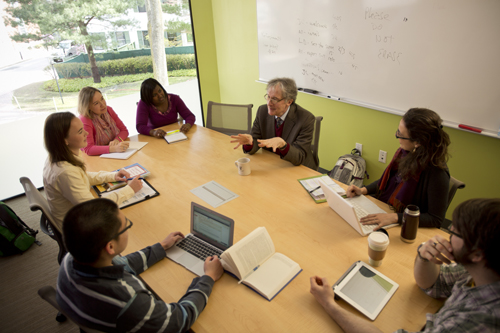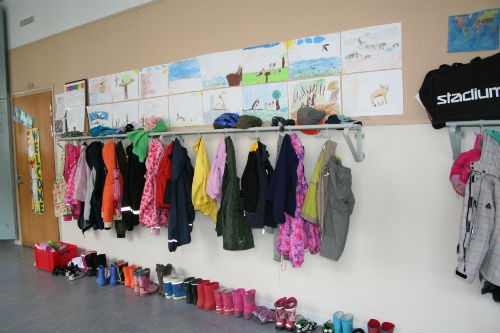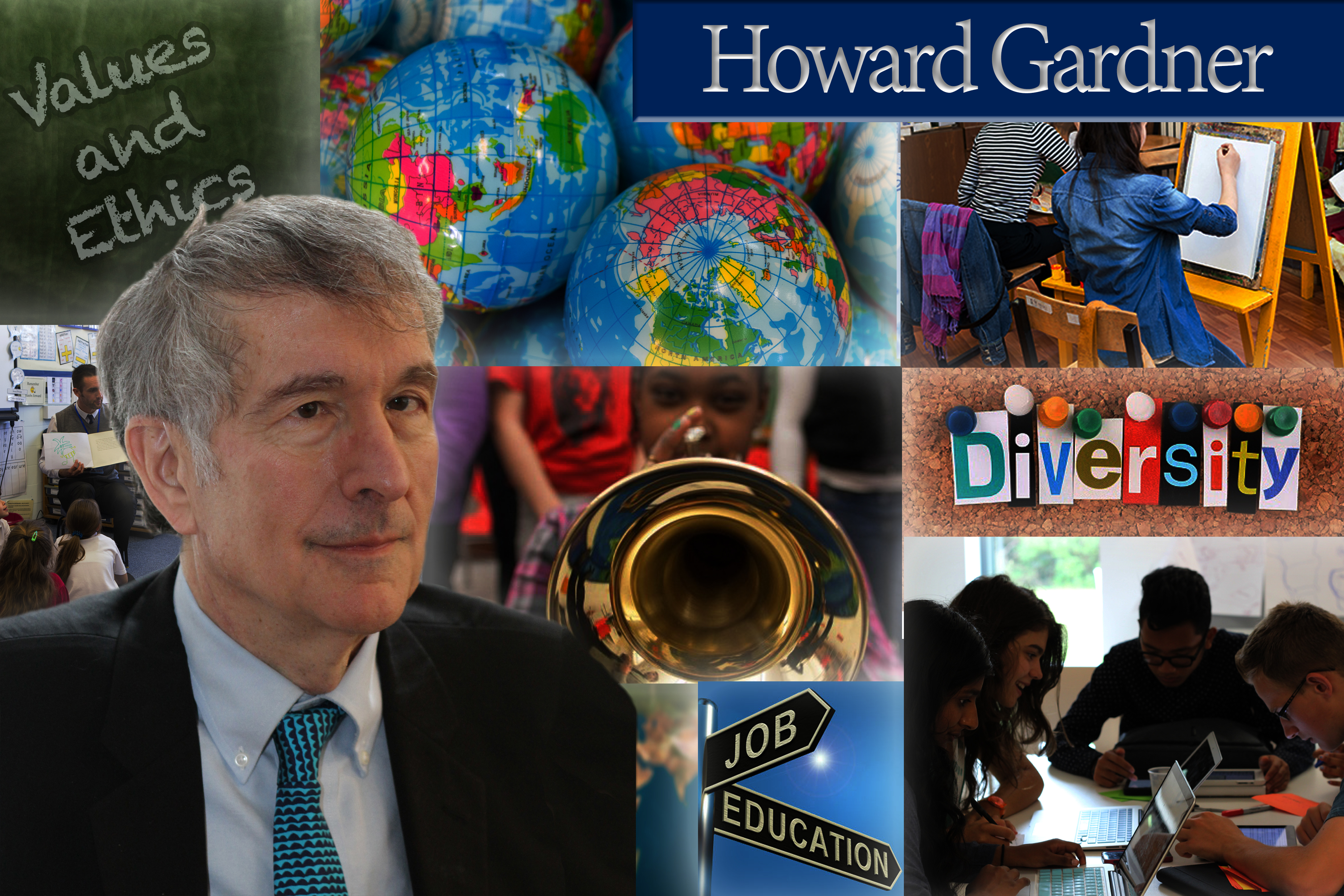Ever since he went to Wyoming Seminary secondary school, Howard Gardner says he has been captivated with three virtues: “Truth, Beauty, and Goodness” – known at “Sem” as Verum, Pulchrum, Bonum, in his school’s motto.” He concluded that his own life should be guided by these values. In his book, The Disciplined Mind (Penguin Books 2000), he argued that parents, educators and the public at large should strive to enhance these virtues in K – 12 education. The book was not without critics. As an example, in an age of social media, who decides what’s good or true or beautiful? In Truth, Beauty, and Goodness Reframed: Education for the Virtues in the Era of Truthiness and Twitter (Basic Books 2012), Gardner explored which aspects of the virtues could be sustained in our time, and which “had to be rethought, modestly or fundamentally.”
I invited Howard Gardner to join me in The Global Search for Education to discuss what else we might learn about Truth, Beauty and Goodness from the U.S Election 2016.
“Politicians blessed with charisma are likely to create beautiful experiences. Presidents Reagan, Clinton, and Obama created beautiful experiences for their audiences.” — Howard Gardner
Howard, a teacher mentioned (in the context of the recent US Election), “We are living in a time when we can expect to see many changes fundamentally in the things that we have always taken for granted.” What do you see as the fundamental task of education in a changing world; a world of infinite connectivity and disruptive technologies?
I’m now teaching a course on this topic. Informally, I have described the course as “Between the Literacies and the Livelihoods.”
Almost all agree that the first job of school is to help students master the basic literacies—reading, writing, arithmetic, perhaps coding. And certainly within the contemporary United States, most have come to believe—rightly or wrongly—that the principal purpose of higher education is to secure a job. But what should come in between?
In an effective educational system, Literacies are attained by the ages of 9-10; and securing a Livelihood is the challenge of late adolescence. That leaves a decade to pursue the liberal arts and sciences. In my view, the liberal arts and sciences are the time-honored avenue by means of which we approach the trio of truth, beauty, and goodness; the liberal arts teach us how to evaluate evidence, confront new perspectives, make considered value judgments, express ourselves clearly and thoughtfully.
How have these ideas (truth, beauty, and goodness) informed your view on the 2016 election and our political future going forward?
The process and the outcome of the election were, to put it mildly, unexpected! Nor has it been easy or straightforward to understand the way in which a large part of the electorate approached the election and voted. Yet again, I’ve had to “rethink” the virtues.
“Rather than judging the candidates using the ethics of roles, the public weighed them in terms of neighborly morality. They judged the candidates in terms of whether they were perceived as ‘my friend’, feeling ‘my pain’, speaking directly to me, making me feel better, or more optimistic.” — Howard Gardner
What lessons can we learn about the virtue of Truth in this election?
The biggest surprise has been how little importance large portions of the electorate placed on whether statements made by candidates (or their surrogates) accord with the facts. Time and again, Donald Trump said things that could easily be demonstrated to be false—the so-called “pants on fire” metric. This did not seem to faze his supporters.
While Hillary Clinton’s tally for truth-telling was somewhat better, she was widely (and, I believe, correctly) perceived as being legalistically truthful but otherwise suspect. And so when Trump called her “Lying Hillary,” the label seemed more apt than, say, a characterization of “Lying Barack” or “Lying Michelle.” Truthiness triumphed over truthfulness—and whether truthfulness will count more in future political campaigns is anyone’s guess. As some (including the Oxford dictionary) have suggested, we may live in a “post-truth” society. And if so, by what standards can we judge what’s been said or written?
What lessons about the virtue of Beauty?
My definition of truth—the accuracy of statements—is conventional; my definition of beauty less so. I apply the descriptor “beautiful” to experiences. An experience counts as “beautiful” to the extent that it fulfills three criteria: 1) it captures one’s interest; 2) its form is memorable; and 3) the experiencer would like to relive the experience.
Politicians blessed with charisma are likely to create beautiful experiences. Presidents Reagan, Clinton, and Obama created beautiful experiences for their audiences. Alas, Hillary Clinton does poorly on these criteria—she could not pass Charisma 101.
Personally, I found it painful to watch and listen to either candidate. But many Americans — even those who did not support him — found it intriguing to behold Trump and came back for more. Without doubt, his lengthy immersion in reality television—aided by the public’s love affair with that genre—enabled him to create beautiful experiences.
“Getting elected is one thing. It remains to be determined in what ways, if any, the Trump presidency will be marked by truthful statements, beautiful experiences, good relations among citizens.” — Howard Gardner
I apply the descriptor “good” to desirable relations among human beings—and I distinguish two kinds. Neighborly morality describes how we strive to relate to family, friends, and neighbors. See the Ten Commandments and the Golden Rule.
But these ancient texts cannot tell us how to resolve an ethical dilemma at work, how to petition, how to vote, how to click our support, when to mobilize or to become a whistle blower. For these situations, we need what I call the ethics of roles. In such cases, for guidance we might turn to the Hippocratic Oath (or whatever embodies the core values of our profession), or the U.S. Constitution (or some other foundational document), to determine how to behave in our roles as workers or citizens. And then we discuss options with those whose opinions we value.
I will leave it to others to draw conclusions about the extent to which Hillary Clinton and Donald Trump are actually good family members, good neighbors, good workers, or good citizens. Certainly it is possible to be good in one sphere and to fall short in the other. But I will share my thinking about Election 2016.
Each of the candidates sought to convey goodness to the public. Their platforms and policy recommendations had little impact—much of the public seemed little interested in how either candidate would function as president (worker) and whether either would in fact pursue the public interest (citizen).
Rather than judging the candidates using the ethics of roles, the public weighed them in terms of neighborly morality. They judged the candidates in terms of whether they were perceived as “my friend,” feeling “my pain,” speaking directly to me, making me feel better, or more optimistic.
As we know, Clinton was successful with many women and minorities, those in urban regions, those with more education; Trump was successful with many men, with whites (who thought of themselves as “real” Americans), those in rural regions, and those with less education.
Why results that surprised so many? Trump proved a better reader of what “goods” were wanted. He spoke to economic insecurity, promising to bring back jobs. No matter that he did not explain how. No matter that much of what he said was not true. What mattered is that Trump made people feel good; the majority of those in the Rust Belt felt they’d rather have a beer with Donald Trump (though he does not drink) than bourbon with Hillary Clinton.
I feel acutely uncomfortable with any election that ignores truth, that focuses only on neighborly (and not civic) virtues, and that places too much value on experiences that are interesting and memorable.
What virtue do you see in the election of Donald Trump? Any advice for our future President on this topic?
Of course, getting elected is one thing. It remains to be determined in what ways, if any, the Trump presidency will be marked by truthful statements, beautiful experiences, good relations among citizens.
Thank you Howard.

C. M. Rubin and Howard Gardner
Join me and globally renowned thought leaders including Sir Michael Barber (UK), Dr. Michael Block (U.S.), Dr. Leon Botstein (U.S.), Professor Clay Christensen (U.S.), Dr. Linda Darling-Hammond (U.S.), Dr. MadhavChavan (India), Professor Michael Fullan (Canada), Professor Howard Gardner (U.S.), Professor Andy Hargreaves (U.S.), Professor Yvonne Hellman (The Netherlands), Professor Kristin Helstad (Norway), Jean Hendrickson (U.S.), Professor Rose Hipkins (New Zealand), Professor Cornelia Hoogland (Canada), Honourable Jeff Johnson (Canada), Mme. Chantal Kaufmann (Belgium), Dr. EijaKauppinen (Finland), State Secretary TapioKosunen (Finland), Professor Dominique Lafontaine (Belgium), Professor Hugh Lauder (UK), Lord Ken Macdonald (UK), Professor Geoff Masters (Australia), Professor Barry McGaw (Australia), Shiv Nadar (India), Professor R. Natarajan (India), Dr. Pak Tee Ng (Singapore), Dr. Denise Pope (US), Sridhar Rajagopalan (India), Dr. Diane Ravitch (U.S.), Richard Wilson Riley (U.S.), Sir Ken Robinson (UK), Professor Pasi Sahlberg (Finland), Professor Manabu Sato (Japan), Andreas Schleicher (PISA, OECD), Dr. Anthony Seldon (UK), Dr. David Shaffer (U.S.), Dr. Kirsten Sivesind (Norway), Chancellor Stephen Spahn (U.S.), Yves Theze (LyceeFrancais U.S.), Professor Charles Ungerleider (Canada), Professor Tony Wagner (U.S.), Sir David Watson (UK), Professor Dylan Wiliam (UK), Dr. Mark Wormald (UK), Professor Theo Wubbels (The Netherlands), Professor Michael Young (UK), and Professor Minxuan Zhang (China) as they explore the big picture education questions that all nations face today.
The Global Search for Education Community Page
C. M. Rubin is the author of two widely read online series for which she received a 2011 Upton Sinclair award, “The Global Search for Education” and “How Will We Read?” She is also the author of three bestselling books, including The Real Alice in Wonderland, is the publisher of CMRubinWorld, and is a Disruptor Foundation Fellow.
Follow C. M. Rubin on Twitter: www.twitter.com/@cmrubinworld










Recent Comments